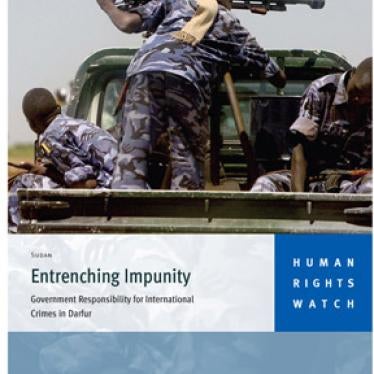(New York, January 20, 2008) - The reported appointment of notorious "Janjaweed" leader Musa Hilal as special advisor to President Omar El Bashir of Sudan is a stunning affront to victims of Janjaweed atrocities in Darfur. The appointment of Hilal, who is subject to a United Nations travel ban for his role in Darfur, comes less than two weeks before an African Union summit where Bashir is due to meet with UN Secretary-General Ban Ki-moon, and it underscores the urgent need to put justice high up on the agenda.
"Musa Hilal is the poster child for Janjaweed atrocities in Darfur," said Richard Dicker, director of the International Justice Program at Human Rights Watch. "Rewarding him with a special government post is a slap in the face to Darfur victims and to the UN Security Council."
According to research by Human Rights Watch, Hilal and his men played an integral role in the two-year campaign of ethnic cleansing by the Sudanese army and Janjaweed militia. Scores of victims, witnesses to attacks, and even members of the Sudanese armed forces have named Hilal as the top commander of government-backed Janjaweed militias responsible for numerous atrocities in Darfur in 2003 and 2004. Hilal was named by the US State Department as early as July 2004 as one of six militia leaders alleged to be responsible for serious crimes in Darfur. The UN Security Council imposed travel bans and asset freezes on Hilal and three others on April 22, 2006.
Human Rights Watch urges Ban Ki-moon to press Bashir to revoke the Hilal appointment and instead to investigate him for crimes in Darfur. The secretary-general should also insist on the arrest and surrender of the two suspects sought for arrest by the International Criminal Court (ICC). "We look to the secretary-general to take a strong position on this when he meets with President Bashir in Addis," said Dicker.
Human Rights Watch research shows that Hilal was actively involved with training camps for Janjaweed, and that he and his men participated in several large attacks on North Darfur villages in 2003 and 2004. A government document obtained by Human Rights Watch specifically named Hilal, ordering all security units to "allow the activities of the mujaheedin and the volunteers under the command of Sheikh Musa Hilal to proceed."
"Musa Hilal's promotion is Sudan's latest challenge to the international community and its commitment to the victims of Darfur," said Dicker. "It is not the first example of Khartoum promoting alleged war criminals instead of prosecuting them."
On April 27, 2007, the ICC issued arrest warrants for Ahmed Haroun and Ali Kosheib for 51 counts of crimes against humanity and war crimes in relation to events in four West Darfur villages. In September, the Sudanese government appointed ICC suspect and State Minister of Humanitarian Affairs Ahmed Haroun to co-chair a committee designated to hear complaints from victims of human rights abuses. Haroun is now the government's liaison with the hybrid UN-AU Mission in Darfur (UNAMID). In October, the Sudanese government released from custody the second ICC suspect, Ali Kosheib, who had been imprisoned in Sudan on unrelated charges.
Background
Sheikh Musa Hilal was released from prison in Port Sudan in April 2003 after a rebel attack on Fashir, North Darfur. Shortly afterwards, Hilal convened a meeting with leaders of all the local Arab tribesmen in which he ordered tribesmen to attack and burn non-Arab villages and to loot livestock. The meeting marked a turning point after which government support flowed to the militia.
Although, in a videotaped interview with Human Rights Watch in 2004, Musa Hilal deferred responsibility for the attacks to the Sudanese armed forces, he admitted to his key role in the recruitment of Janjaweed. "I have not led military groups, I only asked our people to join. I am only a coordinator for the PDF (Popular Defense Forces) ... " he told Human Rights Watch.
|
News Release
Sudan: Notorious Janjaweed Leader Promoted
Appointment of Musa Hilal an Affront to Darfur Victims
Your tax deductible gift can help stop human rights violations and save lives around the world.
Most Viewed
-
November 25, 2019
A Dirty Investment

-
December 21, 2023
Meta’s Broken Promises

-
June 3, 2025
“They’re Ruining People’s Lives”

-
December 11, 2018
No Support

-
December 4, 2020
“They’re Chasing Us Away from Sport”



